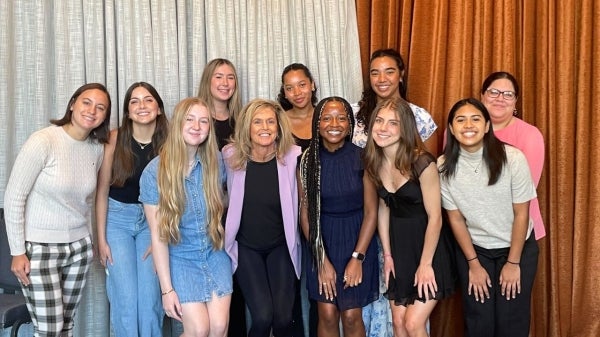The 2016 presidential primary process has broken most of the rules and confounded most of the experts.
Few were able to predict the rise of Republican frontrunner Donald J. Trump, the billionaire businessman waging a war on political correctness as he seeks the nation's top office.
Now some in the "establishment" wing of the GOP — if such a thing even exists anymore — are turning their attention to how they can halt the seemingly inexorable rise of Trump before he captures the nomination. And one way, they posit, might be for Trump's competitorsStill in the race for the GOP nod are Sen. Ted Cruz of Texas, Sen. Marco Rubio of Florida, and Gov. John Kasich of Ohio. to stay in the race long enough, winning just enough to keep the frontrunner from mathematically clinching the race. If that happens it would throw the contest into a brokered convention, something the nation hasn't seen since 1976.
What does that mean?
Since four statesMichigan, Mississippi and Idaho hold primaries Tuesday; Hawaii is having a Republican caucus. are holding Republican primaries Tuesday, and the picture looks like it'll stay muddled, ASU Now turned to presidential historian Brooks SimpsonSimpson is also a member of ASU's College of Letters and Science faculty. , (pictured at left) a professor in Arizona State University’s Barrett, the Honors College, to get some perspective on the history of brokered conventions.
Question: Some believe the Republican nomination will be decided in a brokered convention. What is a brokered convention?
Answer: A brokered convention results when no candidate has a majority of the party’s total delegates pledged to that person’s candidacy by the time the convention meetsThe 41st Republican National Convention will be held July 18-21 in Cleveland.. This last happened in 1976, when neither Gerald Ford nor Ronald Reagan had secured the allegiance of a majority of delegates before the convention. When a slim majority of Mississippi’s delegates decided to support Ford prior to the first ballot, the president claimed the nomination. In the 1952 Republican national convention, Dwight D. Eisenhower won the party’s nod on the first ballot only after some delegates abandoned their initial preference. The last time a convention needed a second ballot to nominate its presidential candidate was that same year, when Democrats took three ballots to nominate Adlai Stevenson.
Q: How would a brokered convention affect the party’s prospects in the general election?
A: The discussion about the possibility of a brokered convention this year currently focuses on the Republicans, as opponents of Donald J. Trump’s candidacy explore ways to deny the New Yorker the nomination. Should Trump secure the support of a plurality of delegates but fall short of gaining a majority, the anti-Trump forces might unite behind one of the other candidates still in the race or look outside the current candidate pool for someone to defeat Trump. In either case, voters might well wonder whether the Republican leadership stole the nomination from Trump, casting doubt upon the process and reinforcing Trump’s anti-establishment appeal. Such a controversy might well secure the presidency for the probable Democratic nominee, Hillary Clinton, should Trump supporters defect from Republican ranks.
Q: Is there any historical precedent for brokered conventions?
A: Yes. Indeed, before the rise of primaries as an important part of the candidate selection process, brokered conventions were not unusual. Abraham Lincoln is perhaps the best-known nominee to come out of a brokered convention, although he trailed Republican front-runner William Henry Seward on the first ballot. Lincoln won on the third ballot. In 1924 the Democratic party took 103 ballots to choose John W. Davis; in 1880 the Republicans chose James A. Garfield on the thirty-sixth ballot, although he had not entered the convention as a candidate and had not received a single vote on the first ballot.
The rise of the primary as the way in which parties choose who delegates will support has had a fundamental impact on the system. This was not always the case: in 1968 Hubert H. Humphrey won the Democratic party’s nomination without running in the primaries. The Democratic party sought to limit the impact of the primaries by instituting so-called superdelegatesIn the Democratic Party a superdelegate is an unelected delegate who is free to support any candidate for the presidential nomination at the party's national convention. to insure that party leaders played a more visible role in the selection process by being free to choose who to support; the Republicans have not followed suit.
Q: Do you see any parallels between the 2016 election cycle and any previous cycle?
A: For all of the attention paid to Trump, 2016 is not the first time a businessman mounted a bid for the presidency, as anyone who recalls H. Ross Perot can attest. Even Trump has toyed with the idea of running for office before. Nor is it the first time that the so-called party establishment has sought to rally to prevent the nomination of a so-called outsider: the Democratic leadership was taken aback by the success of Jimmy Carter in 1976, and mainstream Republicans dreaded the candidacy of Barry Goldwater in 1964. In those two cases the establishment’s efforts proved too late and too little. What’s new in 2016 is the success of an outsider businessman swooping into a party’s presidential nominee selection process through the shrewd use of media and the primary system.
Top photo: Ronald Reagan, left, and Gerald Ford shake hands during the 1976 Republican convention, which was the last time a convention was brokered. Courtesy Wikimedia Commons
More Law, journalism and politics

Cronkite School launches Women Leaders in Sports Media live-learn program
Women in a new sports media program at Arizona State University got a solid game plan from a sports veteran at an Aug. 20 welcome event.“Be humble, be consistent and be a solver,” Charli Turner…

ASU center to host the Pursuits of Education and Excellence Symposium
The Center for the Study of Race and Democracy (CSRD) at Arizona State University is introducing the Pursuits of Education and Excellence Symposium as part of an ongoing initiative to commemorate the…
ASU journalism students dominate NATAS Student Production Award nominations
Students at Arizona State University’s Walter Cronkite School of Journalism and Mass Communication dominated the nominations field of the prestigious Rocky Mountain Southwest Chapter of the National…

